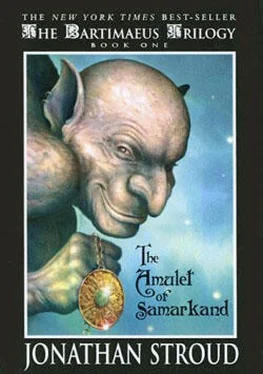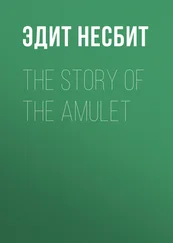He didn't rise to the bait. He was too tired. "However," I continued, "I can feel in my essence that they are hiding something at the Hall. These defenses are in place two days too early, which involves a colossal expenditure of power. That implies mischief going on."
"How long will it take to get there?"
"We can reach the edge of the estate by nightfall—if we catch an early morning train. There's a long walk at the other end. But we'll need to get going now."
"Very well." He began to get up, squelching and oozing as he did so.
"Are you sure about this plan?" I said. "I could take you to the docks instead. There's bound to be vacancies for cabin boys there. It's a hard life, but a good one. Think of all that salty air."
There was no answer. He was on his way out. I gave a sigh, snuffed out the fire, and followed him.
The route I selected was a strip of wasteland that ran south and east between the factories and warehouses, following a narrow tributary of the Thames. Although the stream itself was meager, it meandered excessively across its mini flood plain, creating a maze of hummocks, marshes, and little pools that took us the rest of the night to negotiate. Our shoes sank into mud and water, sharp reeds spiked our legs and hands, and mosquitoes whined occasionally about our heads. The boy, by contrast, whined pretty much continually. After his adventures with the Resistance, he was in a very bad temper.
"It's worse for me than it is for you," I snapped, after a particularly petulant outburst. "I could have flown this in five minutes, but oh, no—I have to keep you company. Writhing about in mud and slime is your birthright, human, not mine."
"I can't see where I'm putting my feet," he said. "Create some light, can't you?"
"Yes, if you want to attract the attention of night—flying djinn. The streets are well watched—as you've already discovered—and don't forget Lovelace may still be seeking us too. The only reason I've chosen this way is because it's so dark and unpleasant."
He did not seem greatly comforted by this; nevertheless, his protests ceased. [85] One side—benefit of this route was that its difficulties eventually took his mind off the loss of his precious scrying glass. Honestly, the way he went on about it, you'd think that imp was his blood brother, rather than a vulgar baby impersonator trapped against its will. He did seem to have taken his misfortune personally. But after the loss of his beloved Mrs. Underwood, I suppose the disc was his only friend in the world, poor thing.
As we stumbled on, I considered our situation with my usual impeccable logic. It had been six days since the kid had summoned me. Six days of discomfort building up inside my essence. And no immediate end in sight.
The kid. Where did he rate in my list of all—time human lows? He wasn't the worst master I had endured, [86] A "good master" is a contradiction in terms, of course. Even Solomon would have been insufferable, he was so prissy in his early years, but fortunately he could command 20,000 spirits with one twist of his magic ring, so with him I got plenty of days off.
but he presented some peculiar problems of his own. All sensible magicians, well versed in clever cruelty, know when the time is right to fight. They risk themselves (and their servants) comparatively rarely. But the kid hadn't a clue. He had been overwhelmed by a disaster brought about by his own meddling, and his reaction was to lunge back at his enemy like a wounded snake. Whatever his original grudge against Lovelace, his previous discretion had now been replaced by a desperation powered by grief. Simple things like self—preservation were disregarded in his pride and fury. He was going to his death. Which would have been fine, except he was taking me along for the ride.
I had no solution to this. I was bound to my master. All I could do was try to keep him alive.
By dawn, we had followed the waste strip down from north London almost to the Thames. Here the stream widened briefly before sluicing over a series of weirs into the main river. It was time to rejoin the roads. We climbed a bank to a wire fence (in which I burned a discreet hole), stepped through it and came out on a cobbled street. The political heart of the city was on our right, the Tower district on our left; the Thames stretched ahead. Curfew was safely over, but there was no one yet about.
"Right," I said, halting. "The station is close by. Before we go there, we need to solve a problem."
"Which is?"
"To stop you looking—and smelling—like a swineherd." The various fluids of the wasteland adhered to him in a complex splatter—pattern. He could have been framed and hung up on a fashionable wall.
He frowned. "Yes. Clean me up first. There must be a way."
"There is."
Perhaps I shouldn't have seized him and dunked him in the river. The Thames isn't that much cleaner than the quagmire we'd waded through. Still, it washed off the worst of the muck. After a minute of vigorous dousing, I allowed him to come up, water spouting through his nostrils. He made a gurgling sound that was hard to identify. I had a stab, though.
"Again? You are thorough."
Another good rinsing made him look as good as new. I propped him up in the shadows of a concrete embankment and dried his clothes out with discreet use of a Flame. Oddly, his temper had not improved with his smell, but you can't have everything.
With this matter resolved, we set off and arrived at the railway station in time to catch the first train of the morning south. I stole two tickets from the kiosk, and while sundry attendants were busy combing the platforms for a red—faced clergywoman with a plausible manner, settled back into my seat just as the train got underway. Nathaniel sat in a different part of the carriage—rather pointedly, I thought. His improvised makeover still seemed to rankle with him.
The first part of the journey out of the city was thus the quietest and least troublesome half—hour I had enjoyed since first being summoned. The train pottered along at an arthritic pace through the never—ending outskirts of London, a dispiriting jumbled wilderness of brick that looked like moraine left by a giant glacier. We passed a succession of rundown factories and concrete lots run to waste; beyond them stretched narrow terraced streets, with chimney smoke rising here and there. Once, high up against the bright, colorless cloud that hid the sun, I saw a troop of djinn heading west. Even at that distance, it was possible to pick out the light glinting on their breastplates.
Few people got on or off the train. I relaxed. Djinn don't doze, but I did the equivalent, drifting back through the centuries and contemplating some of my happier moments—magicians' errors, my choice acts of revenge…
This reverie was finally shattered by the boy throwing himself down on the seat opposite me. "I suppose we'd better plan something," he said sulkily. "How can we get through the defenses?"
"With randomly shifting domes and sentries in place," I said, "there's no way we can break in unmolested. We'll need some kind of Trojan horse." He looked blank. "You know—something which seems to be innocent, which they allow in past the gates. In which we're hiding. Honestly—what do they teach you magicians nowadays?" [87] Obviously not classical history. This ignorance would have upset Faquarl, as it happens, who often boasted how he'd given Odysseus the idea for the wooden horse in the first place. I'm sure he was lying, but I can't prove it because I wasn't at Troy: I was in Egypt at the time.
"So, we need to conceal ourselves in something," he grunted. "Any ideas?"
"Nope."
Scowling, he mulled it over. You could almost hear the fleshy innards of his brain straining. "The guests will arrive tomorrow," he mused. "They have to let them in, so there's bound to be a steady stream of traffic getting through the gates. Perhaps we can hitch a ride in someone's car."
Читать дальше









